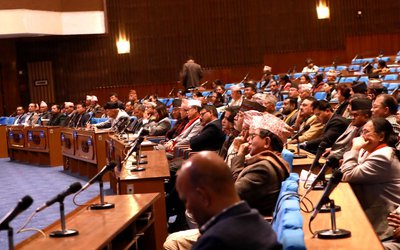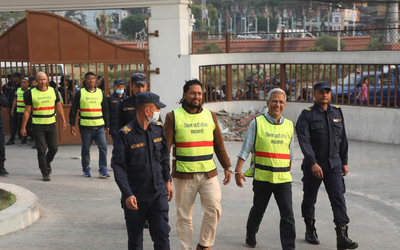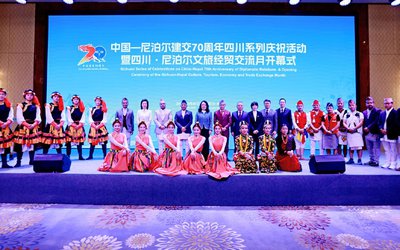More on News





NIBL has been on a journey over the past 25 years, a journey in building itself up to becoming one of the largest banks in Nepal. It now is looking forward to embarking on a bigger, more challenging journey of serving our clients, stakeholders and nation with better products and services in the future. On the 25th anniversary, NIBL pledges to envisage and plan an even brighter future for the bank.
Nepal Indosuez Bank Limited was established in 1986 as a joint venture between the Indosuez Bank Group, Rastriya Banijya Bank, Rastriya Beema Sansthan and public stakeholders. The French party had a 50% stake within the bank and led management and operations from 1986 to 2002, when the French banking giant Credit Agricole took over the Indosuez group resulting in a new entity called Credit Agricole Indosuez which today again is known as Credit Agricole. When Credit Agricole decided to divest from its non core areas of operations which included Nepal, Pakistan, Bangladesh and Cambodia, the French party sold its stake to a group of prominent Nepali bankers, businessmen, professionals and industrialists, who took over operations under the current management and subsequently rebranded the bank as Nepal Investment Bank Limited.
Since then, NIBL has come a long way from being the first bank to be entirely funded by Nepali investors to being one of the leading commercial banks of Nepal.
Today, on the anniversary of 25 years of operations, NIBL is ranked as the number one taxpayer among all Nepali banks, contributing 790 million rupees to the Government last year alone, making it the 5th largest tax payer in Nepal. Over the course of these 25 years, NIBL has paid around 2.8 billion rupees in taxes to the Government, of which 2.4 billion was paid since the acquisition by Nepali investors in 2002.
In 2002, when the French handed over management operations, NIBL had a capital base of 170 million rupees, 6 branches and 25,000 customers. Today, NIBL has a capital base of 2.4 billion rupees, 41 branches and is serving more than 400,000 customers, the highest customer base of any bank in Nepal.
Since 2002, NIBL has achieved notable growth in several other areas as well. NIBL’s deposit base has grown from 4 billion rupees to 48 billion rupees making NIBL the largest private sector bank with respect to deposits.
Last year, NIBL recorded the highest net profit among all commercial banks at 1.26 billion rupees, a massive increase from 57 million rupees in 2002. NIBL is also the highest loan provider in Nepal at 40.95 billion rupees, compared to 2002 levels at 2.7 billion rupees.
Similarly, the Tier 1 capital is the largest of any bank in Nepal at 4.55 billion rupees, up from 523 million in 2002. NIBL’s assets grew to 57.3 billion rupees, representing the highest volume growth as well as the highest level in Nepal.
NIBL has maintained a consistent rating from Indian Credit Rating Agency, ICRA, an affiliate of Moody’s Investor Group, receiving a rating of Nepal [A]. This has reflected NIBL’s strong creditworthiness and our position as the first and only bank in Nepal to have a credit rating, thereby adding additional transparency for our shareholders and regulators.
Nepal Investment Bank Limited has always been an innovative and trend setting bank, often the first bank to launch products such as Visa debit cards, online utility bill payments, telephone bill payments and a no frills savings account at Re. 1 only.
NIBL have strategic ties with Metlife to offer life insurance products through NIBL’s bancansurance program. NIBL is also a partner in the Global Trade Finance Program offered by the International Finance Corporation (IFC) and the Asian Development Bank (ADB). NIBL has also entered into an arrangement with China Development Bank (CDB) to promote project relationships in infrastructure finance in terms of project cooperation, financial consultancy, credit grants and currency swaps.
NIBL has always been committed to building and maintaining a strong relationship with the community at large. Since its inception, Nepal Investment Bank Limited has given top priority to corporate social responsibility, or CSR.
As a part of its CSR, NIBL has been regularly assisting Kathmandu Valley Preservation Trust with their renovation projects. NIBL donated 1.5 million rupees for the restoration of the legendary Kaal Bhairav statue at Hanuman Dhoka premises. In 2007, NIBL also raised 2.5 million rupees from its first corporate marathon to aid the restoration of Sundari Chowk, a World Heritage Site Monument within the Patan Durbar Square complex.
NIBL Heritage Marathon 2009 raised over 7 million rupees for the restoration of Bhaideval Temple and Bhashmeshwor at Pashupati Nath Temple.
NIBL also gave away twenty-five lakh rupees for the Extreme Everest Expedition, the first all Nepali cleanup campaign that cleared out 1800 kilos of garbage and recovered two dead bodies from above 8,000 meters on Mount Everest.
NIBL would like to acknowledge the skills, knowledge, attitude and diligence that have been vital to its success over the past 25 years. NIBL’s total workforce today is at 877 compared to 766 in the previous year. Of the total staff, 41% are female.
NIBL would also like to thank the valuable patronage of all our clients over the past 25 years. NIBL is on a journey to develop Nepal and in the process uplift all its citizens. NIBL pledges to continue to strengthen our services and commitment to all our valued clientele in the future.(Excerpts of the statement delivered by Chairman and Chief Executive Director Pande at a press conference.)






